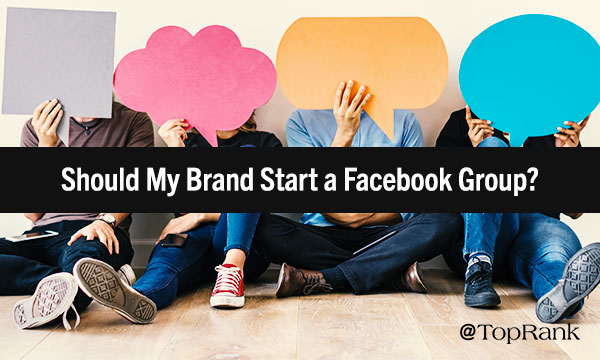Author: Nick Nelson / Source: Online Marketing Blog – TopRank®

Despite its recent bubble of controversy, marketers still view Facebook as the prime destination for social media marketing.
The newly released Sprout Social Index 2018 reaffirms this, with 97% of social marketers saying they use the platform.
However, while almost everyone is incorporating Facebook into their strategies, not so many express confidence that it’s making the desired impact. Last month’s 2018 Social Media Marketing Industry Report showed only 49% reporting a belief that their Facebook marketing is effective.
With algorithmic changes deprioritizing publisher content on Facebook feeds, and thus suppressing organic reach for brands, marketers are feeling the crunch. As I wrote here recently, “Facebook’s gargantuan active user base is impossible to ignore. We just need to get creative in finding ways to connect with people there.”
One creative solution that marketers are increasingly turning to is Facebook groups.
Are they worth your time and effort? Let’s explore.
Why are Facebook Groups Gaining Steam?
Much like influencer marketing, Facebook groups present an opportunity to regain diminished reach by embracing the platform’s heightened focus on user-generated content.
According to the Sprout Social Index, social marketers point to increasing community engagement as their No. 2 biggest goal, right behind boosting brand awareness. Facebook groups are very much in line with this objective. They are mini-communities, where members are empowered to speak up and (in many cases) can engage directly with company reps, in addition to one another.
Although groups have long been available as a feature on Facebook, the brand-driven “Facebook Groups for Pages” were just rolled out last year. You can find a helpful primer on setting one up here, via Social Media Examiner.
What differentiates a Facebook page from a Facebook group, you might ask? AdWeek frames it as such:
“Pages (are) for pushing key marketing messages and product information, as well as an outlet for customer support. Groups is a dedicated space for more in-depth, meaningful conversations and relationships between a brand and its fans.”
Another attractive element of Facebook groups is the added analytical depth through Group Insights, which provides information about trends and usage patterns in your membership.
With growing emphases on engagement, authenticity, and community-building, it’s easy to see the appeal of Facebook groups as a marketing asset. And some are tapping into it very well. One notable example is Peloton, the cycling fitness company whose closed members group boasts an extremely active ecosystem of more than 92,000 members.
But not everyone is finding traction on this front.
With growing emphases on engagement, authenticity, & community-building, it’s easy to see the appeal of #FacebookGroups as a #marketing asset. And some are tapping into it very well. But not everyone is finding traction. – @NickNelsonMN Click To Tweet
What’s Holding Back Brands on Facebook Groups?
Although the potential benefits are clear, the path to achieving them is a bit murky. For every success case like Peloton (which had the advantage of a three-year head start thanks to a preexisting member-driven community), there seem to be several examples…
Peter Bordes Jr
Founder & Managing Partner Trajectory Ventures. Lifetime entrepreneur, CEO, Board Member, mentor, advisor and investor.
Obsessed with the infinite realm of possibility in disruptive innovation driving global digital transformation in technology, cloud-based infrastructure, artificial intelligence, data, DevOps, fintech, robotics, aerospace, blockchain and digital media and advertising.

